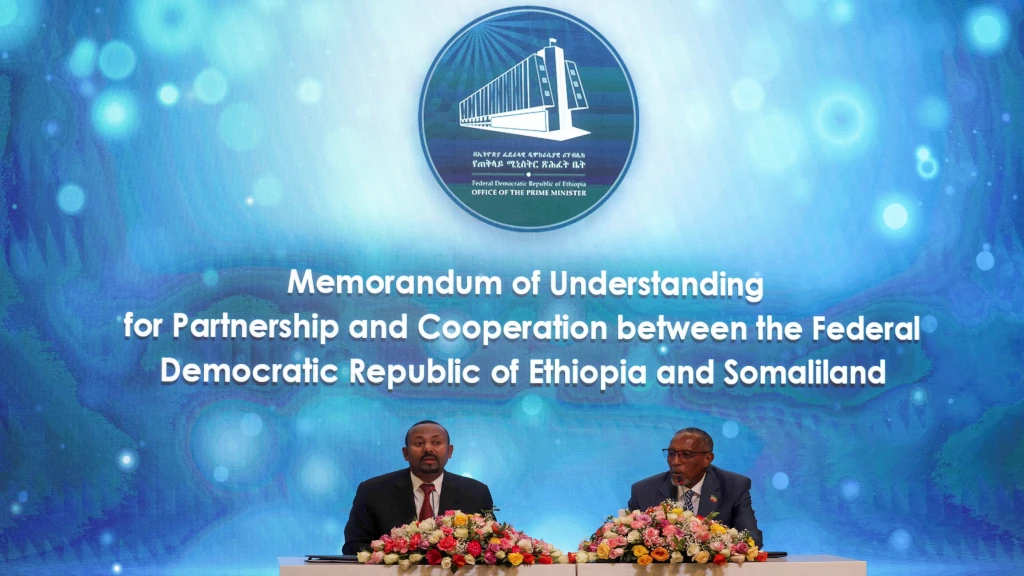The agreement accentuates historical ties between Ethiopia and Somaliland – and historical hostility with Somalia.
Somaliland President Muse Bihi Abdi, right, and Ethiopian Prime Minister Abiy Ahmed attend the signing of an agreement in Addis Ababa, Ethiopia, on January 1, 2024, that allows Ethiopia to use a Somaliland port [Tiksa Negeri/Reuters]
On Monday, an agreement signed in the Ethiopian capital, Addis Ababa, between Prime Minister Abiy Ahmed and President Muse Bihi Abdi of the breakaway republic of Somaliland preceded a shocking announcement that has already set the tone for interstate relations in the Horn of Africa this year.
The memorandum of understanding was for the leasing of 20km (12 miles) of Somaliland’s sea coast to landlocked Ethiopia. In exchange, Somaliland will receive shares in its neighbour’s flagship carrier, Ethiopian Airlines – and receive formal recognition as a sovereign state.
International recognition has been a long-sought goal for Somaliland, a region in northern Somalia that has enjoyed de facto independence since 1991. But the groundbreaking agreement has created shockwaves in the region and fury in Somalia, which views it as a hostile violation of Somalia’s sovereignty.
“As a government, we have condemned and rejected the illegal infringement of Ethiopia into our national sovereignty and territorial integrity yesterday,” Somali President Hassan Sheikh Mohamud said in a statement on X shortly after convening an emergency cabinet session on Tuesday. “Not an inch of Somalia can or will be signed away by anybody.”
In Ethiopia, where for much of 2023 the government stressed the economic need for a seaport and even subtly hinted at possibly invading Eritrea for access to the Red Sea, the deal is being portrayed as a victory.
But the terms of that victory differ for Ethiopia and Somaliland, and that could further complicate the situation in the coming days.
While Somaliland insists that recognition has already been agreed upon and settled, Addis Ababa has been reluctant to firmly address the matter of statehood. In a published communique, the government said it had yet to formally recognise Somaliland. But social media posts by Ethiopian Ministry of Foreign Affairs official Mesganu Arga this week appear to support Somaliland’s interpretation of the deal.
The ambiguity of the messaging continues to fuel speculation. A draft of the agreement has yet to be published, but all indications suggest that it would all but nullify a 2018 tripartite treaty cementing ties between Ethiopia, Somalia and Eritrea, details of which were similarly never made public.
Pressure or patriotism?
Ethiopian officials have been far more eager to speak of the benefits the agreement is said to have secured.
“The agreement is mutually beneficial, and Ethiopia will share military and intelligence experience with Somaliland, so the two states can collaborate on protecting joint interests,” Redwan Hussein, Abiy’s national security adviser, said at the event announcing the agreement. “To facilitate this, Ethiopia will establish a military base in Somaliland as well as a commercial maritime zone.”
Abiy hopes the agreement can help kick-start Ethiopia’s revival after a year of worsening economic woes, internal conflicts and a breakdown in relations with Eritrea. Since the signing of the two countries’ widely heralded peace treaty in 2018, which helped Abiy land the Nobel Peace Prize a year later, Ethiopia has been keen to redirect its imports to Eritrean ports.
But this has never materialised.
Source: Al Jazeera, 4th January 2024
 afric-Invest
afric-Invest